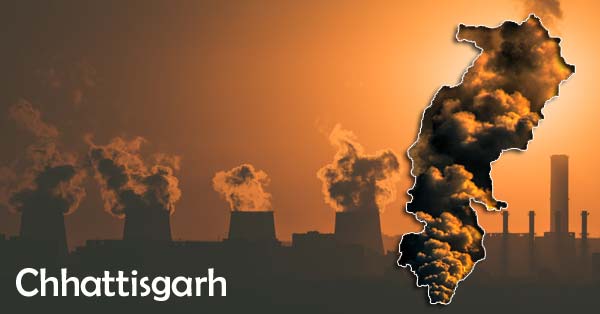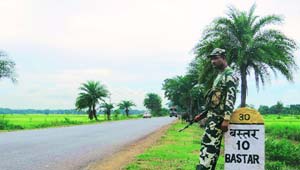Chhattisgarh among top five most polluted states in India
New Delhi | Desk: Chhattisgarh ranks among the top five most polluted states in the country, with Durg district reporting the worst air quality in the state. The other top four states are Delhi, Uttar Pradesh, Bihar, Haryana.
This finding is detailed in a recent report from the Air Quality Life Index (AQLI), published by the Energy Policy Institute at the University of Chicago.
According to the report, the state’s average air quality index is 47.19 micrograms per cubic meter (μg/m³) of PM2.5.
Several districts, including Durg, Raipur, Bemetara, Baloda Bazar, Mungeli, Janjgir-Champa, Kabirdham, Rajnandgaon, Bilaspur, Dhamtari, Balod, and Mahasamund, have recorded air quality levels higher than 47.19 μg/m³.
In contrast, the World Health Organization (WHO) recommends an air quality level of 5 μg/m³.
Chhattisgarh: AIR QUALITY LIFE INDEX® 2024
| Districts | PM2.5 |
|---|---|
| Durg | 63.52 |
| Raipur | 63.45 |
| Bemetara | 61.44 |
| Baloda Bazar | 56.13 |
| Mungeli | 54.54 |
| Janjgir-Champa | 51.87 |
| Kabirdham | 50.91 |
| Rajnandgaon | 50.80 |
| Bilaspur | 50.46 |
| Dhamtari | 50.44 |
| Balod | 49.92 |
| Mahasamund | 49.58 |
| Raigarh | 42.16 |
| Korba | 41.59 |
| Gariaband | 38.56 |
| Uttar Bastar Kanker | 38.27 |
| Surajpur | 34.63 |
| Balrampur | 33.56 |
| Koriya | 33.03 |
| Surguja | 32.84 |
| Narayanpur | 31.14 |
| Kondagaon | 31.10 |
| Jashpur | 31.02 |
| Bastar | 28.52 |
| Dantewada | 23.84 |
| Bijapur | 23.74 |
| Sukma | 23.27 |
The report highlights that air pollution has a more severe impact on life expectancy than smoking, heavy drinking, and major health risks like HIV/AIDS and malnutrition.
This burden is unevenly distributed, with people in the most polluted areas inhaling air that is six times more polluted than in the cleanest regions, leading to an average reduction of 2.7 years in life expectancy.
While many nations have implemented national air quality standards, the report reveals significant issues with enforcement and compliance.
Of the 94 countries with PM2.5 standards, 37 do not meet their own guidelines. Alarmingly, 158 countries have yet to establish any standards.
The potential benefits of enforcing air quality standards are substantial.
If all countries met their air quality goals, the average person could gain an additional 1.2 years of life expectancy.
South Asia saw a decline in pollution levels in 2022 after a decade of rising figures. However, residents in the region still breathe air with pollution levels nearly 8.5 times above WHO guidelines.
Prolonged exposure to this pollution is expected to shorten South Asians’ life spans by 3.5 years, with the impact being even more severe in the most polluted areas.
South Asia remains the most polluted region globally, contributing to 45 percent of the total life years lost worldwide due to severe pollution.
The rise in pollution levels is attributed to rapid industrialization, economic development, and population growth, which have driven up energy demand and fossil fuel use over the past two decades.
The report also identifies additional health risks in India. Particulate pollution reduces life expectancy by 3.6 years, while malnutrition shortens it by 1.6 years, tobacco by 1.5 years, and unsafe water and sanitation by 8.4 months.
States such as Maharashtra, Madhya Pradesh, and Rajasthan experience some of the highest pollution levels in the country, with the 292.3 million residents of these states losing an average of 2.9 years of life expectancy.
Increased energy use has led to improved living standards and economic output, but it has also resulted in rising particulate pollution with serious consequences.
As energy demand in non-OECD regions is expected to rise, the risk of air pollution will escalate unless effective policy measures are implemented.




